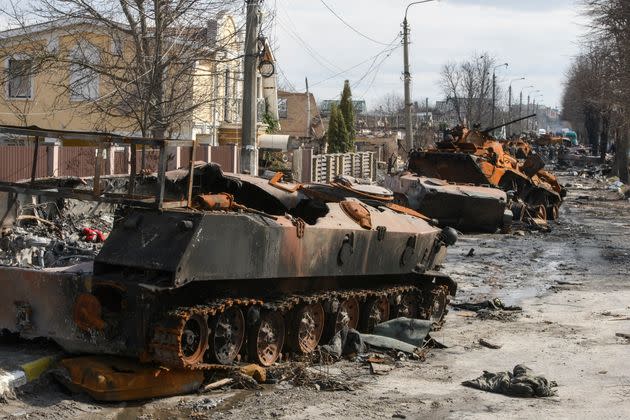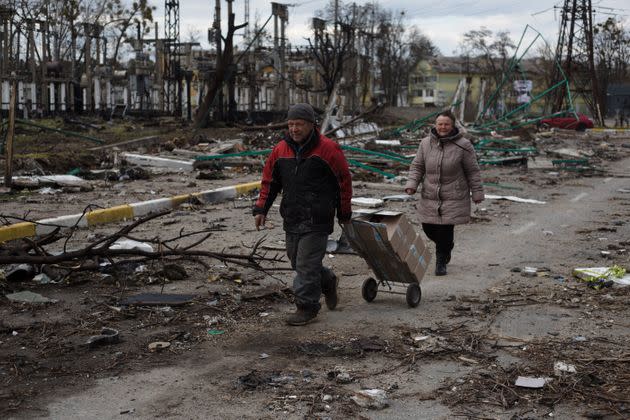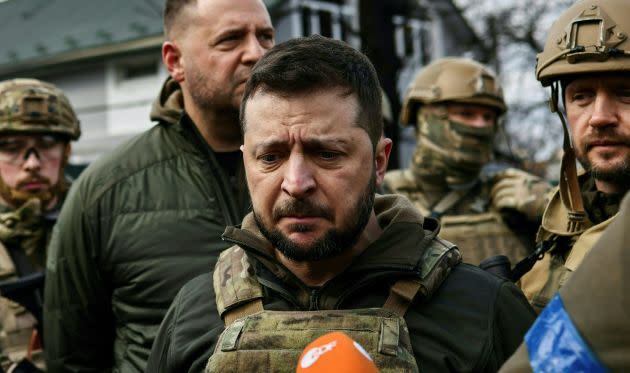Will The Bucha Massacre Be A Turning Point In The Ukraine War?

Street with destroyed Russian military machinery in the recaptured by the Ukrainian army Bucha city near Kyiv. (Photo: NurPhoto via Getty Images)
The massacre uncovered at Bucha, a Ukrainian town, appears to have taken the war to a new low – but could the universal horror galvanise the West into further action?
Here’s a breakdown explaining how the disturbing discovery could shift the entire conflict in a new direction.
What happened in Bucha?
Bucha – just 16 miles away from Kyiv – was targeted by the Russian forces on their way to conquer the capital back in March.
It quickly became a frontline in the conflict as the Ukrainians fought back.
Russian forces then began to withdraw from the region around March 30, reportedly due to a shortage of resources, meaning journalists have been able to access the beleaguered town once again.
The Associated Press released from the town showing bodies on the Bucha streets, with their hands tied behind their backs and wounds to the back of their heads.
According to the news agency, at least 21 bodies were found, with at least nine of them in civilian clothing.
Anatoly Fedoruk, Bucha’s mayor, said more than 300 residents in the town had been killed, while Ukrainian prosecutors allege Russian forces used the basement of one house as a torture chamber.
Satellite images showed a 45ft-long mass grave in the town too.

Local residents walks through the destroyed residential area on April 4, 2022 in Bucha, Ukraine. (Photo: Anastasia Vlasova via Getty Images)
Russia was quick to deny any involvement, alleging that “all Russian unit withdrew completely from Bucha” by the end of March – suggesting the bodies were placed their strategically by the Ukrainians.
Moscow has dismissed any accusations of war crimes too, and claims “Ukrainian radicals” are responsible for the massacre in Bucha as “not a single civilian” faced violent military action from Russian forces.
It claimed that the images of the dead bodies were “stage managed by the Kyiv regime for the Western media”.
This was soon disproved by other satellite imagery dating back to March 19, where bodies can be seen lying on the street when the town was still occupied by the Russians.
Military analyst Professor Michael Clarke told Sky News that the massacre was likely due to Russian soldiers operating in “little friendship groups”.
He alleged that these cliques got out of control, vengeful that Bucha residents decided to carry on with their lives as normal when Russia invaded and that’s what led to the massacre.
Accusations of war crimes grow
The UN Security Council is set to meet on Tuesday to discuss war crimes potentially committed by the Russian army, according to Ukrainian president Volodymyr Zelenskyy.
War crimes are defined by the UN as a serious breach of international humanitarian law committed against civilians or “enemy combatants”.
The West has already repeatedly accused Russia of committing war crimes in the last few weeks, and the International Criminal court’s prosecutor has already opened an investigation into it.
The condemnation against Russia has only grown since the Bucha massacre hit the news.
US President Joe Biden has now called for a war crimes trial against Putin, whom he calls a “war criminal”.
German foreign minister Annalena Baerbock said the photographs show the “unbelievable brutality of the Russian leadership and those who follow its propaganda”, while French president Emmanuel Macron said there is now “clear evidence of war crimes” in Bucha.
The UN High Commissioner for human rights Michelle Bachelet also said she was “horrified” by the sight of the massacre and the photographs raised “serious and disturbing questions about possible war crimes, grave breaches of international humanitarian law and serious violations of international human rights law”.
‘Genocide’ claims from Ukraine
Ukrainian president Volodymyr Zelenskyy has described the evidence from Bucha as “genocide”.
He visited Bucha for his first trip outside of Kyiv since the war began in February, and was soon struggling to hold back his emotions as he witnessed the devastation.
He said civilians in these liberated regions has a been subjected to treatment “not seen even during the Nazi occupation 80 years ago”.
Only on Sunday, Zelenskyy criticised how “hundreds of people killed, tortured, executed civilians”, and said the “bodies on the streets....booby-trapped area... even the bodies of the dead are booby-trapped.”
He vowed: “The time will come when every Russian will learn the whole truth about who among their fellow citizens killed, who gave orders, who turned a blind eye to the murders.”
Wladimir Klitschko, brother of Kyiv’s mayor, also alleged that Bucha is evidence of genocide.

Zelenksyy accused Russia of genocide after the Bucha massacre (Photo: RONALDO SCHEMIDT via Getty Images)
The brutal attack has added to claims that Russia now intends to destroy Ukraine. Previously, Moscow had alleged that it wanted to “liberate” its European neighbour from the so-called “nazification” at the top of the country’s government – even though there is no evidence of Nazis ruling in Ukraine.
Instead of “liberating” Ukraine, Kremlin propaganda now makes clear it wants to destroy it. Russian state media promotes “denazified” Ukraine which will be renamed, those who resist executed or sentenced to forced labour.
— Andrew Neil (@afneil) April 5, 2022
More sanctions from the West?
Ukrainian officials have pleaded for more severe sanctions against Moscow following the “rape, torture and killings” of Russian soldiers.
The country’s foreign minister Dmytro Kuleba said on Monday: “Half measures are not enough anymore. I demand from our partners, on behalf of the victims of Bucha and the people of Ukraine, to take the most severe sanctions against Russia this week.”
Macron seemed to agree that the massacre meant new measures are now needed against Russia.
He told the French press: “I’m in favour of a new round of sanctions and in particular on coal and gasoline. We need to act.”
However, this perspective is not shared across Europe, despite the united sense of outrage at the treatment of the Ukrainians.
Poland is pushing for Europe to quickly come off Russian energy, while Germany wants to gradually phase out the fuel coming from Russia over the coming months.
Meanwhile, the UK has actually called for Russia to be suspended from the UN Human Rights Council over its war crimes.
What does it mean for Russia’s attacks?
The massacre itself might not have changed Russia’s approach, Putin has now redirected his forces away from Kyiv due to the strength of the Ukrainian resistance.
Soldiers will now move a focus towards the Donbas region, which includes the besieged city of Mariupol, as it looks to dominate the south-east.
Access to Ukraine’s second largest city, Kharkiv, is now blocked, according to Ukraine’s general staff, adding: “The enemy is regrouping troops and concentrating its efforts on preparing an offensive operation in the east of our country.”
At the moment, two-thirds of Russian troops are thought to be en route to Belarus or already there for more supplies and reinforcements.
The ministry of defence tweeted out its latest update and concluded fighting is expected to “diminish significantly over this week as the remainder of Russian forces withdraw” and regroup for a fresh redeployment in eastern Ukraine.
Latest Defence Intelligence update on the situation in Ukraine - 5 April 2022
Find out more about the UK government's response: https://t.co/C605aP9hlX
🇺🇦 #StandWithUkraine 🇺🇦 pic.twitter.com/t8wlPfCrqd— Ministry of Defence 🇬🇧 (@DefenceHQ) April 5, 2022
This article originally appeared on HuffPost UK and has been updated.

 Yahoo News
Yahoo News 